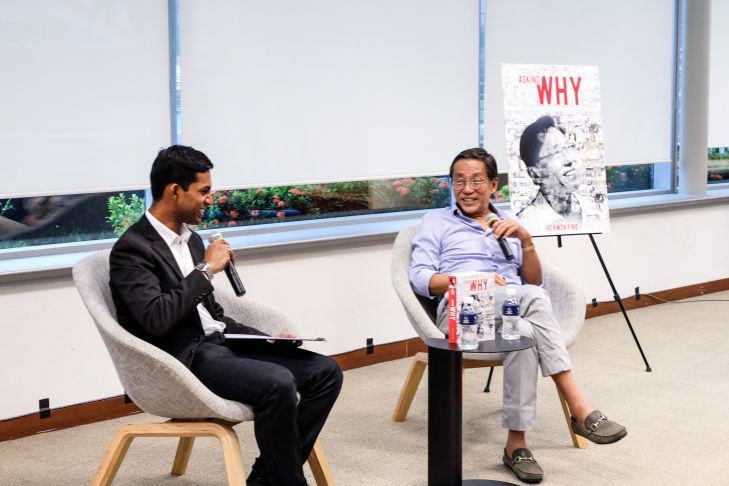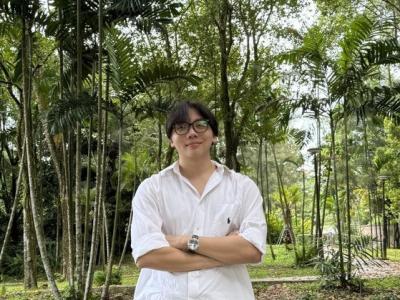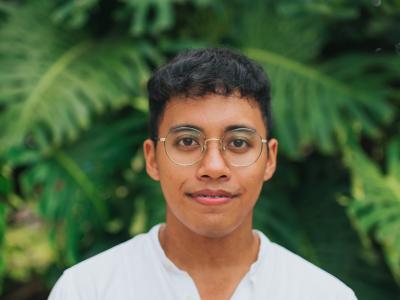
[Caption: SMU Chairman Ho Kwon Ping sharing a light-hearted moment with SMU Apolitical President Abbas Ali Mohamed Anas at his book launch]
The Singapore Management University (SMU) Apolitical* hosted the book launch of “Asking Why: Selected Writings of Ho Kwon Ping” written by SMU Chairman Mr Ho Kwon Ping on Friday, 7 September at the Li Ka Shing Library.
About 80 people, including SMU students, alumni, staff, faculty, as well as junior college and tertiary students from other institutions listened intently to Mr Ho candidly shared his life story, his new book and personal opinions about identity and societal issues.
Mr Ho, 66 years old, said he had grown up with “no identity” as he had stayed in different cities and he felt like a stranger in a strange land. Because of his search for identity, he got into trouble with the government and the law. However, “being the outsider” has also enabled him to be able to put on different lenses in any situation and not be held back by the typical Singaporean view and this he thinks has helped him succeed in life.
He is concerned that Singaporeans are not questioning or challenging their own presumptions and assumptions enough. “I fear the group-think that we have in Singapore, this coddled little space where we do not question…we may have a brilliant society but a brittle one. We will lack resilience, and when a severe crisis hits, we will be running around with our heads cut off, simply because of the lack of diversity.”
Asking "Why?" has the power to build a more discerning society, says Mr Ho and he believes that with asking this question, we can develop new perceptions and that "that’s the only way...things would change anywhere". Those who “ask why” would not always have to arrive at a “contrarian conclusion”, Mr Ho insisted, saying he knows of people who questioned their religion and returned to their faith with far stronger convictions, for instance. And as a step beyond that, young people need to keep asking why. “That’s the only way I think things would change anywhere, whether it be in Singapore, or in the world of science, where a persistence in questioning certain accepted orthodoxies led to huge changes in the way we perceive the physical world around us.”
On the topic of entrepreneurship, he shared his own success story of how he transformed a disused tin mine in Phuket, Thailand into a resort in 1994, and remarked that the irony was that there was merit in “sheer ignorance”. He said that “I had never been to business school. I had never even heard of ‘due diligence’… I had no choice. We found out that it was completely polluted. And with no choice, you basically wing it as you go along… That’s very often the source of entrepreneurship.” He felt that knowing too much sometimes leads to inaction but now if one were to ask him if he would have taken the risks he had taken earlier, he probably wouldn’t have.
Mr Ho remarked that there is no formula to entrepreneurship, “There is an over-romanticised notion of the 20-plus-year-old entrepreneur going into their proverbial garages and (make it) straightaway to become Steve Jobs or Bill Gates”. He felt that young entrepreneurs should not feel guilty when they join a multi-national company upon graduation and that they should pick up knowledge and skills and earn their stripes in someone else’s firm before they are ready to take the leap to start their own business.
When asked about how he found his purpose in life, Mr Ho said that there is “no eureka moment” when one wakes up feeling destined to do something. Instead he shared that, “whoever I am today, is a sum total of everything I was”. He advised that we should never waste a single moment in your life thinking that a great opportunity would come one day, in fact, “every day you are creating your future destination”. He added that we had to live our life always looking for an opportunity to make something meaningful out of it and that every decision we make has an impact later on.
The hour-long dialogue session was moderated by SMU Apolitical President Abbas Ali Mohamed Anas (Business undergraduate) and the event ended with a book signing by Mr Ho.

Mr Ho's new book is sold at major bookstores at $35 (before GST).
*About SMU Apolitical: Formed in 2010, SMU Apolitical is a student-led association that provides platforms for the SMU community to gain a better understanding of the policy-making process and the issues that affect our society today.
Related news articles:
- Today Online: Without questioning minds, S’pore could become ‘brilliant but brittle’: Ho Kwon Ping (7 Sep 2018)
- The Straits Times: Banyan Tree’s Ho Kwon Ping is now more jackfruit than durian (2 Sep 2018)
View more pictures here on Facebook:

